Comparing and Contrasting Deontology and Utilitarianism Theories
VerifiedAdded on 2023/04/08
|10
|2416
|487
Essay
AI Summary
This essay provides a comprehensive analysis of two prominent normative ethical theories: deontology and utilitarianism. It begins with a detailed explanation of each theory, outlining their core principles and methodologies for moral judgment. Deontology, rooted in duty and obligation, emphasizes the inherent rightness or wrongness of actions, irrespective of their consequences, while utilitarianism prioritizes the outcome, advocating for actions that maximize overall happiness or well-being. The essay then proceeds to compare and contrast these two theories, highlighting their similarities, such as their shared aim of determining right and wrong, and their differences, including their approaches to ethical decision-making. Finally, the essay critically evaluates both theories, discussing their strengths, weaknesses, and potential limitations in practical application, particularly within the context of bioethics. The analysis considers the challenges of applying each theory and provides a nuanced understanding of their respective contributions to moral reasoning.
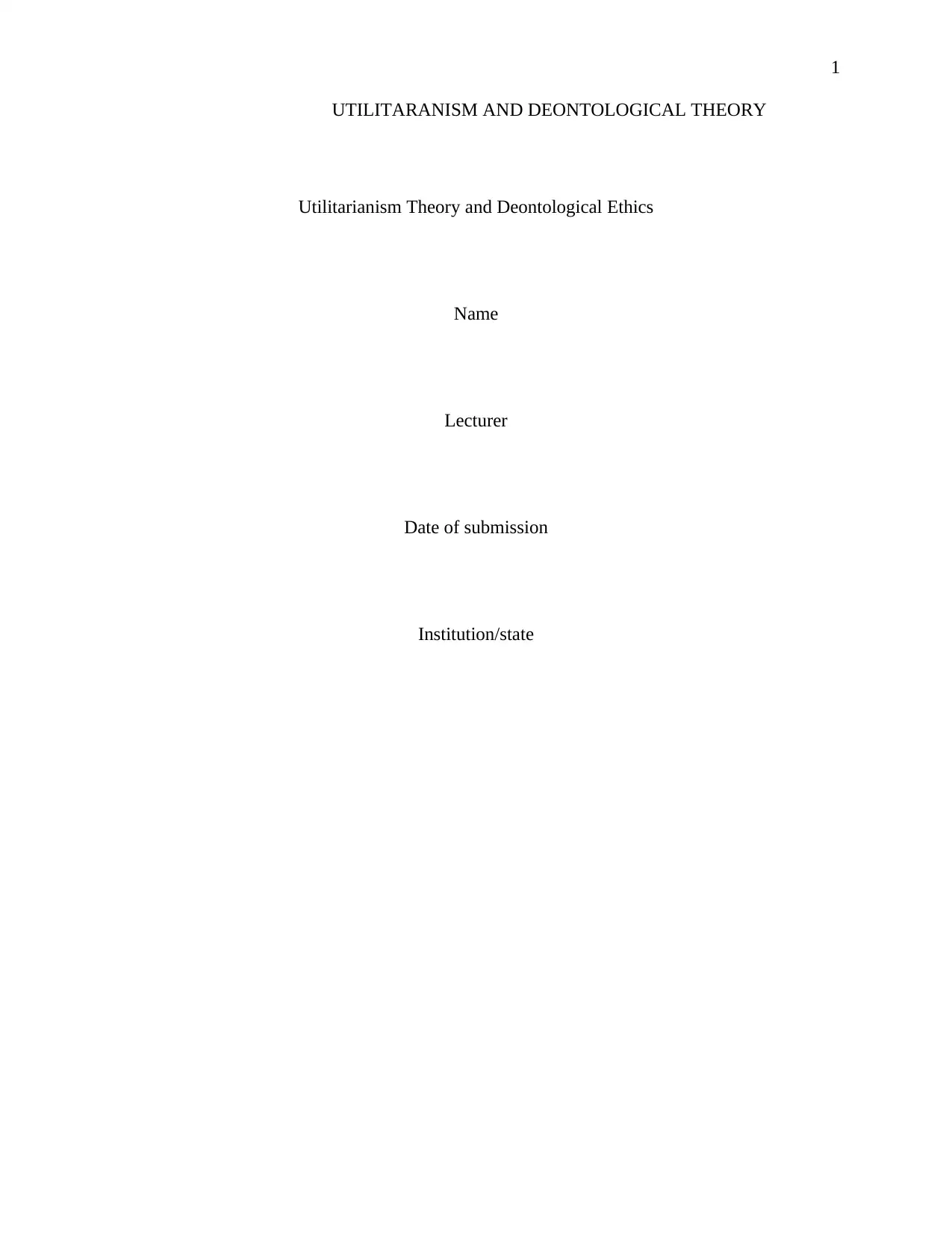
1
UTILITARANISM AND DEONTOLOGICAL THEORY
Utilitarianism Theory and Deontological Ethics
Name
Lecturer
Date of submission
Institution/state
UTILITARANISM AND DEONTOLOGICAL THEORY
Utilitarianism Theory and Deontological Ethics
Name
Lecturer
Date of submission
Institution/state
Paraphrase This Document
Need a fresh take? Get an instant paraphrase of this document with our AI Paraphraser
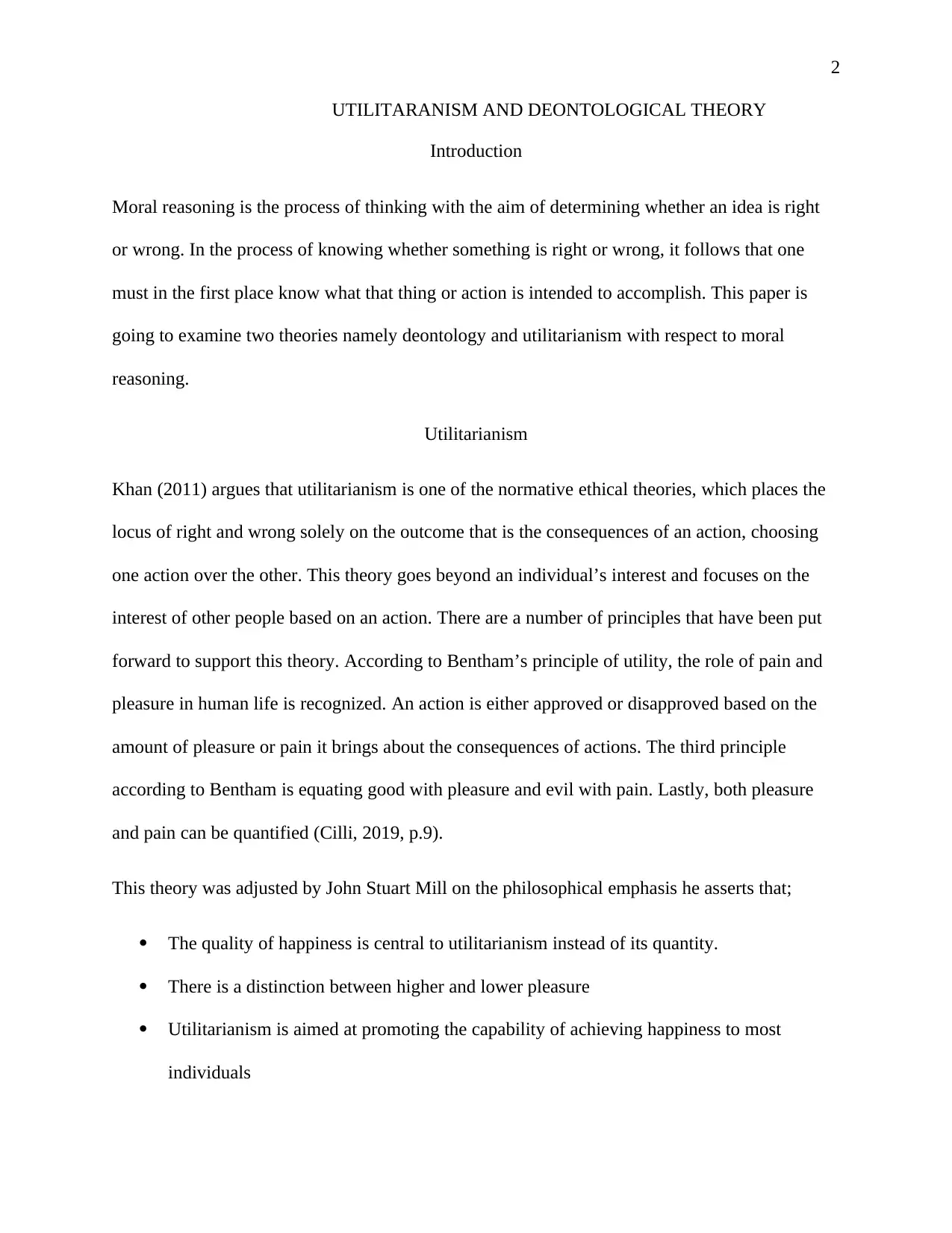
2
UTILITARANISM AND DEONTOLOGICAL THEORY
Introduction
Moral reasoning is the process of thinking with the aim of determining whether an idea is right
or wrong. In the process of knowing whether something is right or wrong, it follows that one
must in the first place know what that thing or action is intended to accomplish. This paper is
going to examine two theories namely deontology and utilitarianism with respect to moral
reasoning.
Utilitarianism
Khan (2011) argues that utilitarianism is one of the normative ethical theories, which places the
locus of right and wrong solely on the outcome that is the consequences of an action, choosing
one action over the other. This theory goes beyond an individual’s interest and focuses on the
interest of other people based on an action. There are a number of principles that have been put
forward to support this theory. According to Bentham’s principle of utility, the role of pain and
pleasure in human life is recognized. An action is either approved or disapproved based on the
amount of pleasure or pain it brings about the consequences of actions. The third principle
according to Bentham is equating good with pleasure and evil with pain. Lastly, both pleasure
and pain can be quantified (Cilli, 2019, p.9).
This theory was adjusted by John Stuart Mill on the philosophical emphasis he asserts that;
The quality of happiness is central to utilitarianism instead of its quantity.
There is a distinction between higher and lower pleasure
Utilitarianism is aimed at promoting the capability of achieving happiness to most
individuals
UTILITARANISM AND DEONTOLOGICAL THEORY
Introduction
Moral reasoning is the process of thinking with the aim of determining whether an idea is right
or wrong. In the process of knowing whether something is right or wrong, it follows that one
must in the first place know what that thing or action is intended to accomplish. This paper is
going to examine two theories namely deontology and utilitarianism with respect to moral
reasoning.
Utilitarianism
Khan (2011) argues that utilitarianism is one of the normative ethical theories, which places the
locus of right and wrong solely on the outcome that is the consequences of an action, choosing
one action over the other. This theory goes beyond an individual’s interest and focuses on the
interest of other people based on an action. There are a number of principles that have been put
forward to support this theory. According to Bentham’s principle of utility, the role of pain and
pleasure in human life is recognized. An action is either approved or disapproved based on the
amount of pleasure or pain it brings about the consequences of actions. The third principle
according to Bentham is equating good with pleasure and evil with pain. Lastly, both pleasure
and pain can be quantified (Cilli, 2019, p.9).
This theory was adjusted by John Stuart Mill on the philosophical emphasis he asserts that;
The quality of happiness is central to utilitarianism instead of its quantity.
There is a distinction between higher and lower pleasure
Utilitarianism is aimed at promoting the capability of achieving happiness to most
individuals
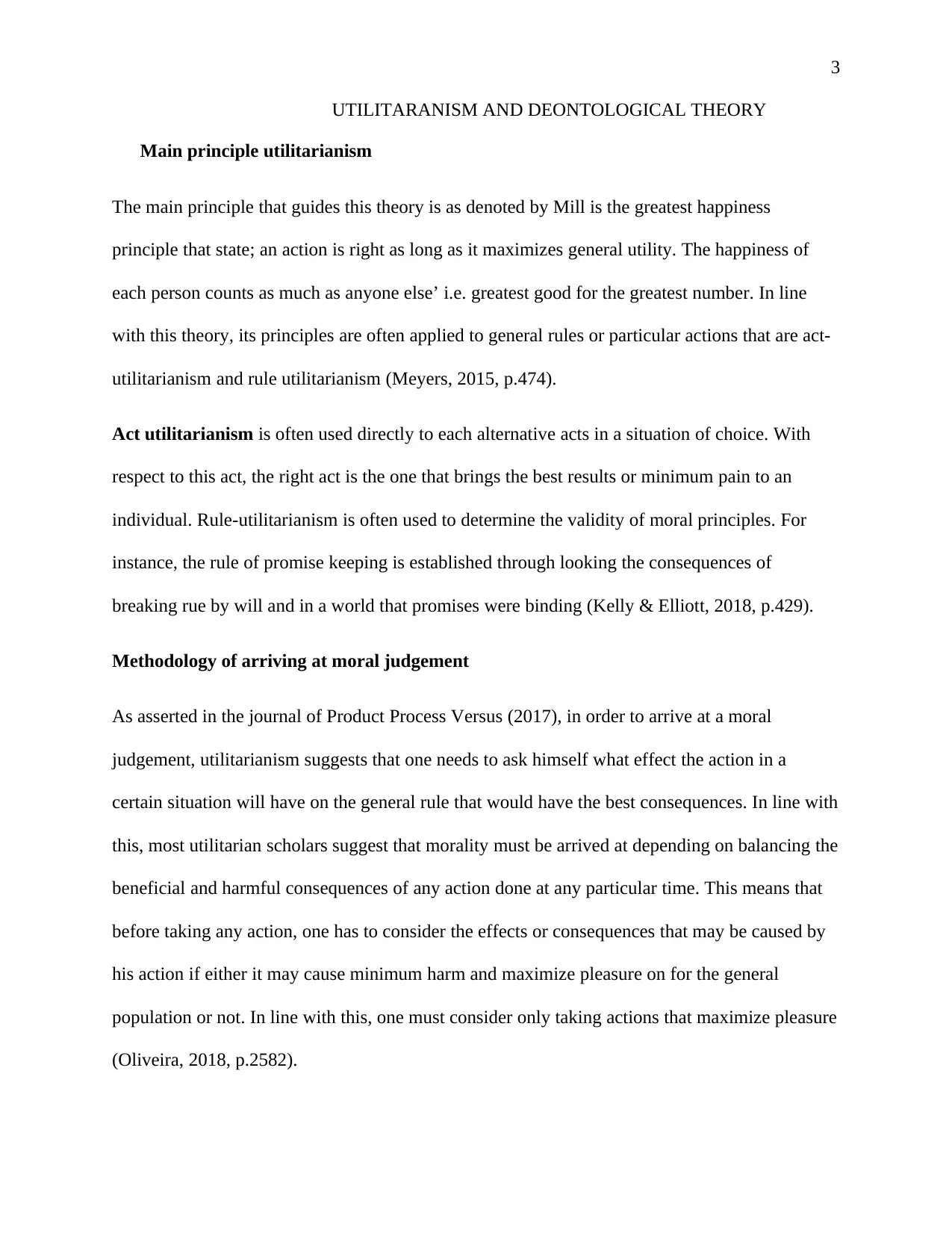
3
UTILITARANISM AND DEONTOLOGICAL THEORY
Main principle utilitarianism
The main principle that guides this theory is as denoted by Mill is the greatest happiness
principle that state; an action is right as long as it maximizes general utility. The happiness of
each person counts as much as anyone else’ i.e. greatest good for the greatest number. In line
with this theory, its principles are often applied to general rules or particular actions that are act-
utilitarianism and rule utilitarianism (Meyers, 2015, p.474).
Act utilitarianism is often used directly to each alternative acts in a situation of choice. With
respect to this act, the right act is the one that brings the best results or minimum pain to an
individual. Rule-utilitarianism is often used to determine the validity of moral principles. For
instance, the rule of promise keeping is established through looking the consequences of
breaking rue by will and in a world that promises were binding (Kelly & Elliott, 2018, p.429).
Methodology of arriving at moral judgement
As asserted in the journal of Product Process Versus (2017), in order to arrive at a moral
judgement, utilitarianism suggests that one needs to ask himself what effect the action in a
certain situation will have on the general rule that would have the best consequences. In line with
this, most utilitarian scholars suggest that morality must be arrived at depending on balancing the
beneficial and harmful consequences of any action done at any particular time. This means that
before taking any action, one has to consider the effects or consequences that may be caused by
his action if either it may cause minimum harm and maximize pleasure on for the general
population or not. In line with this, one must consider only taking actions that maximize pleasure
(Oliveira, 2018, p.2582).
UTILITARANISM AND DEONTOLOGICAL THEORY
Main principle utilitarianism
The main principle that guides this theory is as denoted by Mill is the greatest happiness
principle that state; an action is right as long as it maximizes general utility. The happiness of
each person counts as much as anyone else’ i.e. greatest good for the greatest number. In line
with this theory, its principles are often applied to general rules or particular actions that are act-
utilitarianism and rule utilitarianism (Meyers, 2015, p.474).
Act utilitarianism is often used directly to each alternative acts in a situation of choice. With
respect to this act, the right act is the one that brings the best results or minimum pain to an
individual. Rule-utilitarianism is often used to determine the validity of moral principles. For
instance, the rule of promise keeping is established through looking the consequences of
breaking rue by will and in a world that promises were binding (Kelly & Elliott, 2018, p.429).
Methodology of arriving at moral judgement
As asserted in the journal of Product Process Versus (2017), in order to arrive at a moral
judgement, utilitarianism suggests that one needs to ask himself what effect the action in a
certain situation will have on the general rule that would have the best consequences. In line with
this, most utilitarian scholars suggest that morality must be arrived at depending on balancing the
beneficial and harmful consequences of any action done at any particular time. This means that
before taking any action, one has to consider the effects or consequences that may be caused by
his action if either it may cause minimum harm and maximize pleasure on for the general
population or not. In line with this, one must consider only taking actions that maximize pleasure
(Oliveira, 2018, p.2582).
⊘ This is a preview!⊘
Do you want full access?
Subscribe today to unlock all pages.

Trusted by 1+ million students worldwide
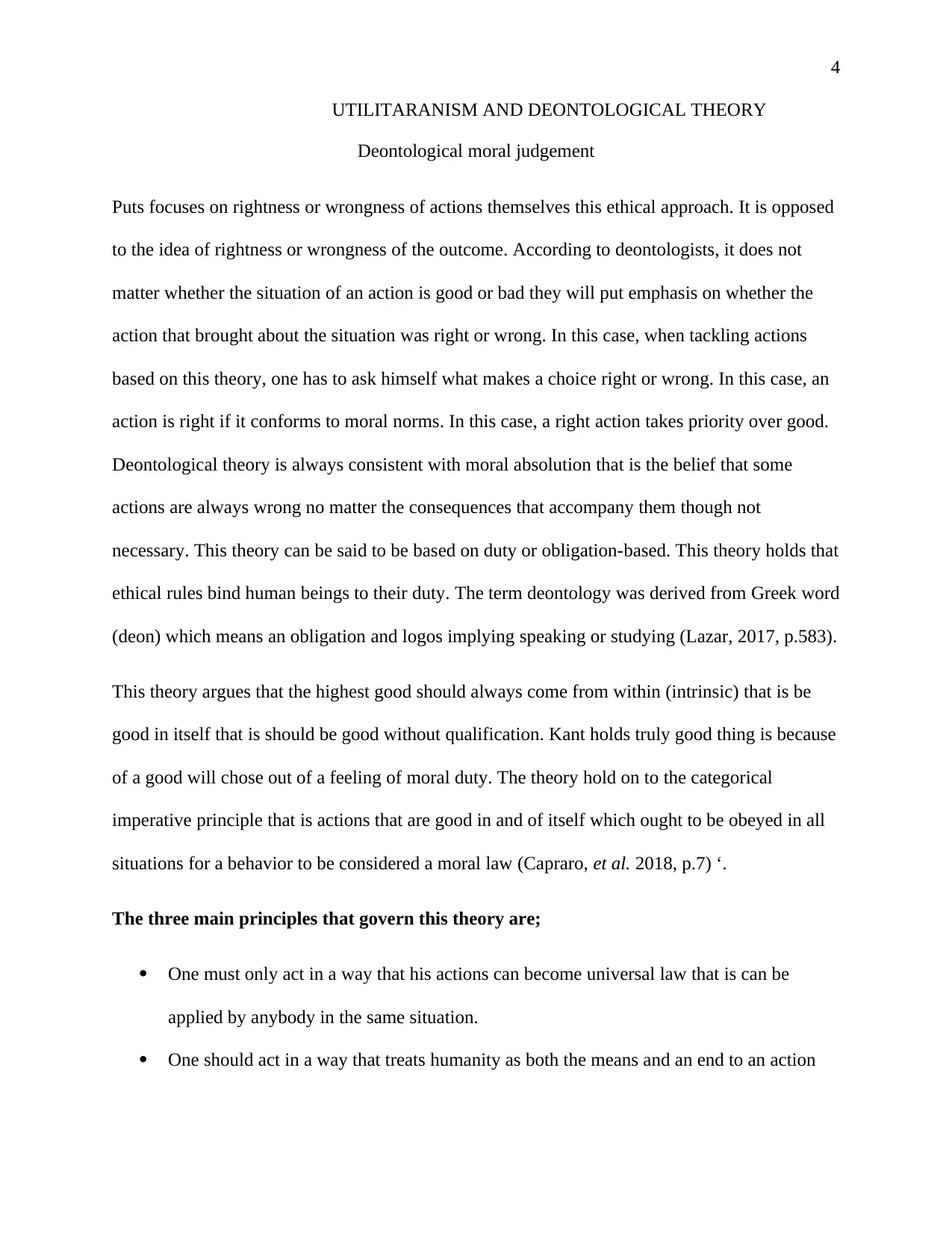
4
UTILITARANISM AND DEONTOLOGICAL THEORY
Deontological moral judgement
Puts focuses on rightness or wrongness of actions themselves this ethical approach. It is opposed
to the idea of rightness or wrongness of the outcome. According to deontologists, it does not
matter whether the situation of an action is good or bad they will put emphasis on whether the
action that brought about the situation was right or wrong. In this case, when tackling actions
based on this theory, one has to ask himself what makes a choice right or wrong. In this case, an
action is right if it conforms to moral norms. In this case, a right action takes priority over good.
Deontological theory is always consistent with moral absolution that is the belief that some
actions are always wrong no matter the consequences that accompany them though not
necessary. This theory can be said to be based on duty or obligation-based. This theory holds that
ethical rules bind human beings to their duty. The term deontology was derived from Greek word
(deon) which means an obligation and logos implying speaking or studying (Lazar, 2017, p.583).
This theory argues that the highest good should always come from within (intrinsic) that is be
good in itself that is should be good without qualification. Kant holds truly good thing is because
of a good will chose out of a feeling of moral duty. The theory hold on to the categorical
imperative principle that is actions that are good in and of itself which ought to be obeyed in all
situations for a behavior to be considered a moral law (Capraro, et al. 2018, p.7) ‘.
The three main principles that govern this theory are;
One must only act in a way that his actions can become universal law that is can be
applied by anybody in the same situation.
One should act in a way that treats humanity as both the means and an end to an action
UTILITARANISM AND DEONTOLOGICAL THEORY
Deontological moral judgement
Puts focuses on rightness or wrongness of actions themselves this ethical approach. It is opposed
to the idea of rightness or wrongness of the outcome. According to deontologists, it does not
matter whether the situation of an action is good or bad they will put emphasis on whether the
action that brought about the situation was right or wrong. In this case, when tackling actions
based on this theory, one has to ask himself what makes a choice right or wrong. In this case, an
action is right if it conforms to moral norms. In this case, a right action takes priority over good.
Deontological theory is always consistent with moral absolution that is the belief that some
actions are always wrong no matter the consequences that accompany them though not
necessary. This theory can be said to be based on duty or obligation-based. This theory holds that
ethical rules bind human beings to their duty. The term deontology was derived from Greek word
(deon) which means an obligation and logos implying speaking or studying (Lazar, 2017, p.583).
This theory argues that the highest good should always come from within (intrinsic) that is be
good in itself that is should be good without qualification. Kant holds truly good thing is because
of a good will chose out of a feeling of moral duty. The theory hold on to the categorical
imperative principle that is actions that are good in and of itself which ought to be obeyed in all
situations for a behavior to be considered a moral law (Capraro, et al. 2018, p.7) ‘.
The three main principles that govern this theory are;
One must only act in a way that his actions can become universal law that is can be
applied by anybody in the same situation.
One should act in a way that treats humanity as both the means and an end to an action
Paraphrase This Document
Need a fresh take? Get an instant paraphrase of this document with our AI Paraphraser
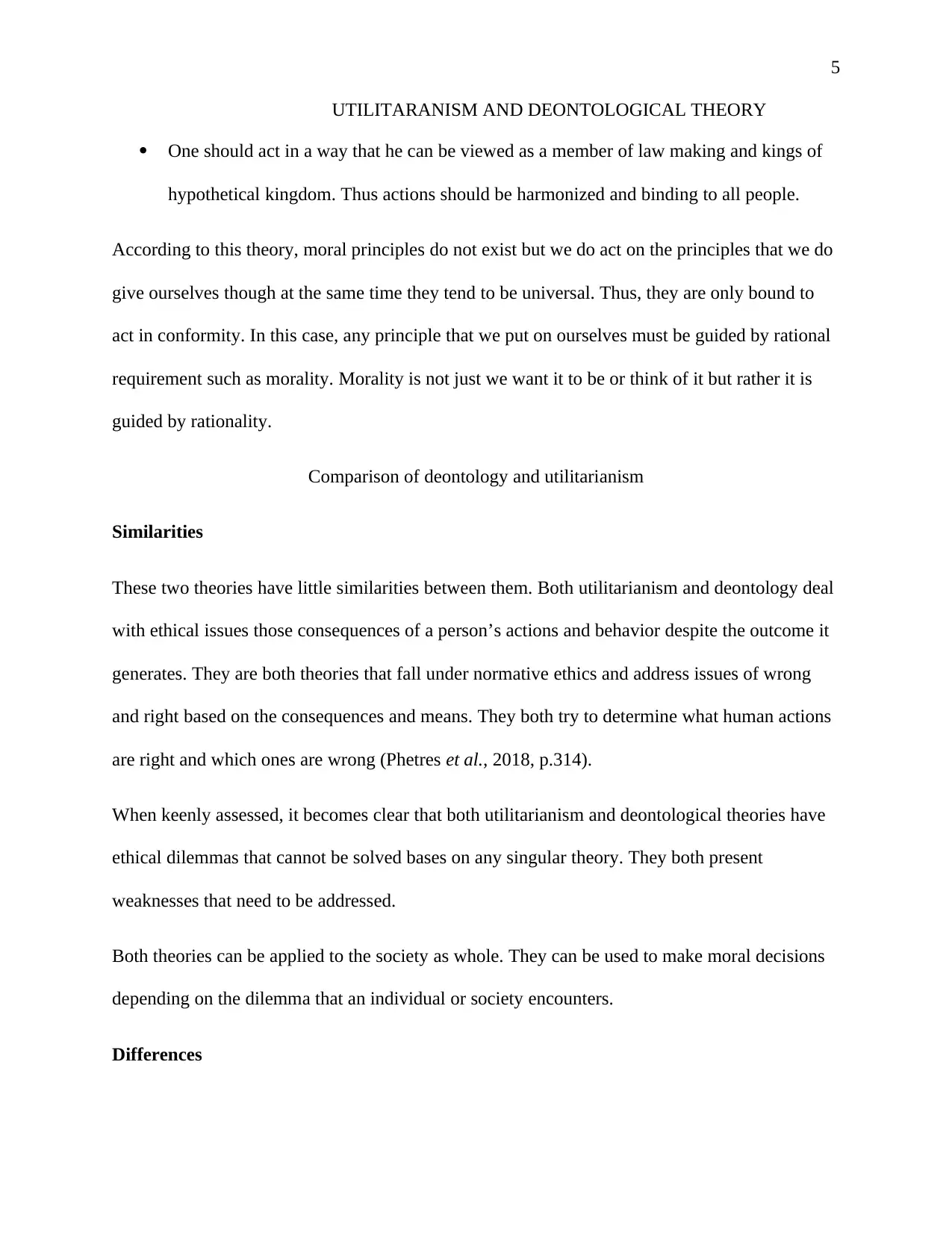
5
UTILITARANISM AND DEONTOLOGICAL THEORY
One should act in a way that he can be viewed as a member of law making and kings of
hypothetical kingdom. Thus actions should be harmonized and binding to all people.
According to this theory, moral principles do not exist but we do act on the principles that we do
give ourselves though at the same time they tend to be universal. Thus, they are only bound to
act in conformity. In this case, any principle that we put on ourselves must be guided by rational
requirement such as morality. Morality is not just we want it to be or think of it but rather it is
guided by rationality.
Comparison of deontology and utilitarianism
Similarities
These two theories have little similarities between them. Both utilitarianism and deontology deal
with ethical issues those consequences of a person’s actions and behavior despite the outcome it
generates. They are both theories that fall under normative ethics and address issues of wrong
and right based on the consequences and means. They both try to determine what human actions
are right and which ones are wrong (Phetres et al., 2018, p.314).
When keenly assessed, it becomes clear that both utilitarianism and deontological theories have
ethical dilemmas that cannot be solved bases on any singular theory. They both present
weaknesses that need to be addressed.
Both theories can be applied to the society as whole. They can be used to make moral decisions
depending on the dilemma that an individual or society encounters.
Differences
UTILITARANISM AND DEONTOLOGICAL THEORY
One should act in a way that he can be viewed as a member of law making and kings of
hypothetical kingdom. Thus actions should be harmonized and binding to all people.
According to this theory, moral principles do not exist but we do act on the principles that we do
give ourselves though at the same time they tend to be universal. Thus, they are only bound to
act in conformity. In this case, any principle that we put on ourselves must be guided by rational
requirement such as morality. Morality is not just we want it to be or think of it but rather it is
guided by rationality.
Comparison of deontology and utilitarianism
Similarities
These two theories have little similarities between them. Both utilitarianism and deontology deal
with ethical issues those consequences of a person’s actions and behavior despite the outcome it
generates. They are both theories that fall under normative ethics and address issues of wrong
and right based on the consequences and means. They both try to determine what human actions
are right and which ones are wrong (Phetres et al., 2018, p.314).
When keenly assessed, it becomes clear that both utilitarianism and deontological theories have
ethical dilemmas that cannot be solved bases on any singular theory. They both present
weaknesses that need to be addressed.
Both theories can be applied to the society as whole. They can be used to make moral decisions
depending on the dilemma that an individual or society encounters.
Differences
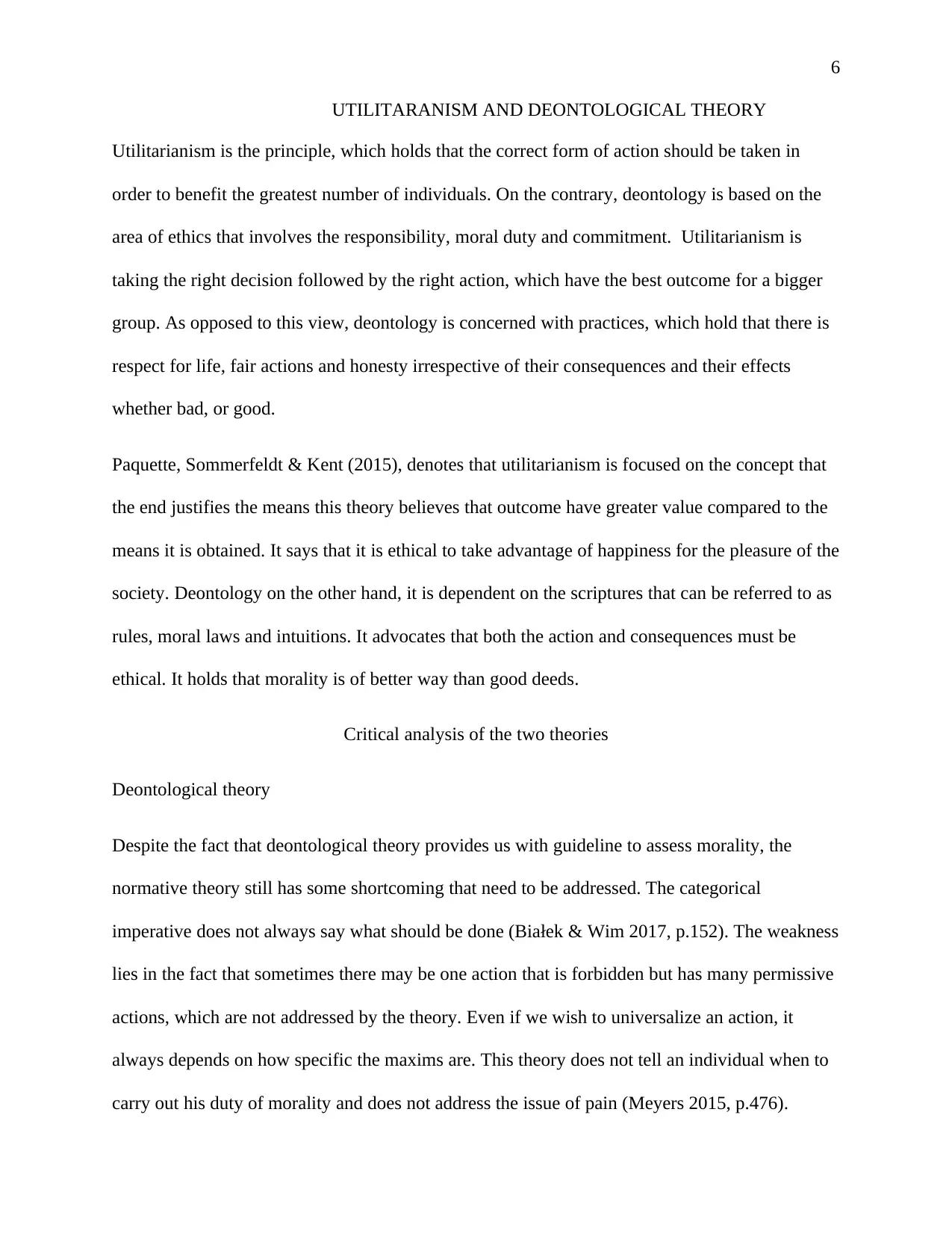
6
UTILITARANISM AND DEONTOLOGICAL THEORY
Utilitarianism is the principle, which holds that the correct form of action should be taken in
order to benefit the greatest number of individuals. On the contrary, deontology is based on the
area of ethics that involves the responsibility, moral duty and commitment. Utilitarianism is
taking the right decision followed by the right action, which have the best outcome for a bigger
group. As opposed to this view, deontology is concerned with practices, which hold that there is
respect for life, fair actions and honesty irrespective of their consequences and their effects
whether bad, or good.
Paquette, Sommerfeldt & Kent (2015), denotes that utilitarianism is focused on the concept that
the end justifies the means this theory believes that outcome have greater value compared to the
means it is obtained. It says that it is ethical to take advantage of happiness for the pleasure of the
society. Deontology on the other hand, it is dependent on the scriptures that can be referred to as
rules, moral laws and intuitions. It advocates that both the action and consequences must be
ethical. It holds that morality is of better way than good deeds.
Critical analysis of the two theories
Deontological theory
Despite the fact that deontological theory provides us with guideline to assess morality, the
normative theory still has some shortcoming that need to be addressed. The categorical
imperative does not always say what should be done (Białek & Wim 2017, p.152). The weakness
lies in the fact that sometimes there may be one action that is forbidden but has many permissive
actions, which are not addressed by the theory. Even if we wish to universalize an action, it
always depends on how specific the maxims are. This theory does not tell an individual when to
carry out his duty of morality and does not address the issue of pain (Meyers 2015, p.476).
UTILITARANISM AND DEONTOLOGICAL THEORY
Utilitarianism is the principle, which holds that the correct form of action should be taken in
order to benefit the greatest number of individuals. On the contrary, deontology is based on the
area of ethics that involves the responsibility, moral duty and commitment. Utilitarianism is
taking the right decision followed by the right action, which have the best outcome for a bigger
group. As opposed to this view, deontology is concerned with practices, which hold that there is
respect for life, fair actions and honesty irrespective of their consequences and their effects
whether bad, or good.
Paquette, Sommerfeldt & Kent (2015), denotes that utilitarianism is focused on the concept that
the end justifies the means this theory believes that outcome have greater value compared to the
means it is obtained. It says that it is ethical to take advantage of happiness for the pleasure of the
society. Deontology on the other hand, it is dependent on the scriptures that can be referred to as
rules, moral laws and intuitions. It advocates that both the action and consequences must be
ethical. It holds that morality is of better way than good deeds.
Critical analysis of the two theories
Deontological theory
Despite the fact that deontological theory provides us with guideline to assess morality, the
normative theory still has some shortcoming that need to be addressed. The categorical
imperative does not always say what should be done (Białek & Wim 2017, p.152). The weakness
lies in the fact that sometimes there may be one action that is forbidden but has many permissive
actions, which are not addressed by the theory. Even if we wish to universalize an action, it
always depends on how specific the maxims are. This theory does not tell an individual when to
carry out his duty of morality and does not address the issue of pain (Meyers 2015, p.476).
⊘ This is a preview!⊘
Do you want full access?
Subscribe today to unlock all pages.

Trusted by 1+ million students worldwide
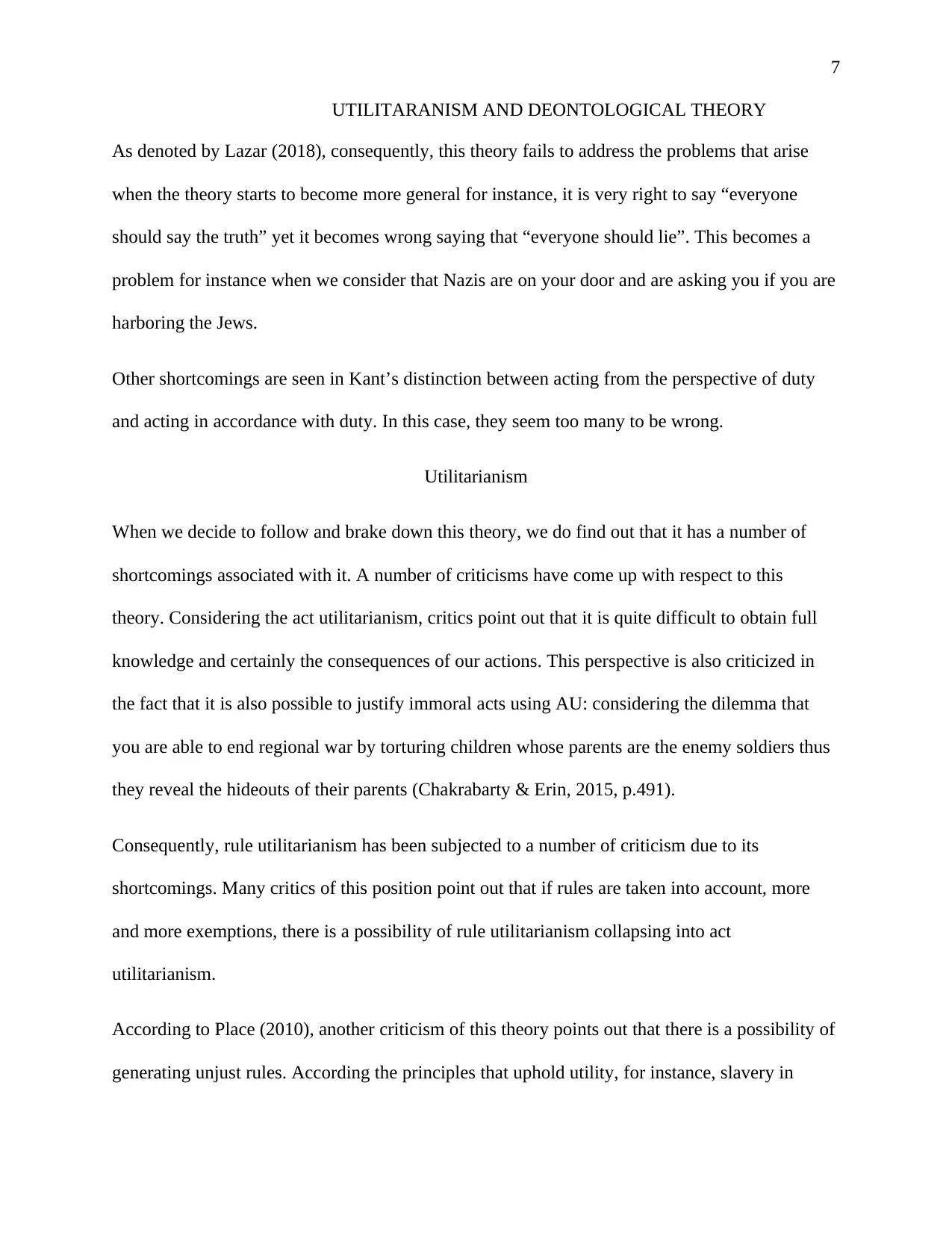
7
UTILITARANISM AND DEONTOLOGICAL THEORY
As denoted by Lazar (2018), consequently, this theory fails to address the problems that arise
when the theory starts to become more general for instance, it is very right to say “everyone
should say the truth” yet it becomes wrong saying that “everyone should lie”. This becomes a
problem for instance when we consider that Nazis are on your door and are asking you if you are
harboring the Jews.
Other shortcomings are seen in Kant’s distinction between acting from the perspective of duty
and acting in accordance with duty. In this case, they seem too many to be wrong.
Utilitarianism
When we decide to follow and brake down this theory, we do find out that it has a number of
shortcomings associated with it. A number of criticisms have come up with respect to this
theory. Considering the act utilitarianism, critics point out that it is quite difficult to obtain full
knowledge and certainly the consequences of our actions. This perspective is also criticized in
the fact that it is also possible to justify immoral acts using AU: considering the dilemma that
you are able to end regional war by torturing children whose parents are the enemy soldiers thus
they reveal the hideouts of their parents (Chakrabarty & Erin, 2015, p.491).
Consequently, rule utilitarianism has been subjected to a number of criticism due to its
shortcomings. Many critics of this position point out that if rules are taken into account, more
and more exemptions, there is a possibility of rule utilitarianism collapsing into act
utilitarianism.
According to Place (2010), another criticism of this theory points out that there is a possibility of
generating unjust rules. According the principles that uphold utility, for instance, slavery in
UTILITARANISM AND DEONTOLOGICAL THEORY
As denoted by Lazar (2018), consequently, this theory fails to address the problems that arise
when the theory starts to become more general for instance, it is very right to say “everyone
should say the truth” yet it becomes wrong saying that “everyone should lie”. This becomes a
problem for instance when we consider that Nazis are on your door and are asking you if you are
harboring the Jews.
Other shortcomings are seen in Kant’s distinction between acting from the perspective of duty
and acting in accordance with duty. In this case, they seem too many to be wrong.
Utilitarianism
When we decide to follow and brake down this theory, we do find out that it has a number of
shortcomings associated with it. A number of criticisms have come up with respect to this
theory. Considering the act utilitarianism, critics point out that it is quite difficult to obtain full
knowledge and certainly the consequences of our actions. This perspective is also criticized in
the fact that it is also possible to justify immoral acts using AU: considering the dilemma that
you are able to end regional war by torturing children whose parents are the enemy soldiers thus
they reveal the hideouts of their parents (Chakrabarty & Erin, 2015, p.491).
Consequently, rule utilitarianism has been subjected to a number of criticism due to its
shortcomings. Many critics of this position point out that if rules are taken into account, more
and more exemptions, there is a possibility of rule utilitarianism collapsing into act
utilitarianism.
According to Place (2010), another criticism of this theory points out that there is a possibility of
generating unjust rules. According the principles that uphold utility, for instance, slavery in
Paraphrase This Document
Need a fresh take? Get an instant paraphrase of this document with our AI Paraphraser
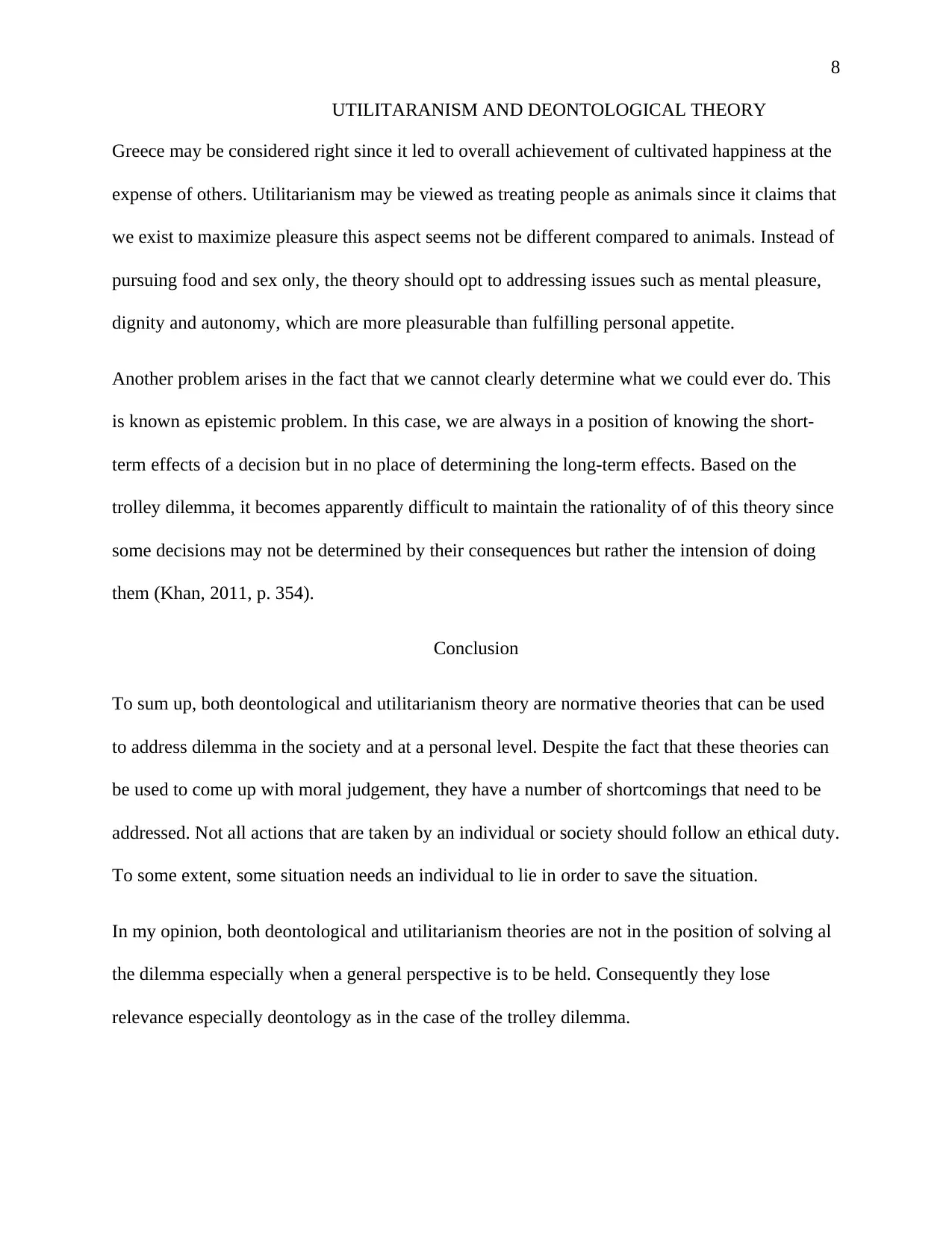
8
UTILITARANISM AND DEONTOLOGICAL THEORY
Greece may be considered right since it led to overall achievement of cultivated happiness at the
expense of others. Utilitarianism may be viewed as treating people as animals since it claims that
we exist to maximize pleasure this aspect seems not be different compared to animals. Instead of
pursuing food and sex only, the theory should opt to addressing issues such as mental pleasure,
dignity and autonomy, which are more pleasurable than fulfilling personal appetite.
Another problem arises in the fact that we cannot clearly determine what we could ever do. This
is known as epistemic problem. In this case, we are always in a position of knowing the short-
term effects of a decision but in no place of determining the long-term effects. Based on the
trolley dilemma, it becomes apparently difficult to maintain the rationality of of this theory since
some decisions may not be determined by their consequences but rather the intension of doing
them (Khan, 2011, p. 354).
Conclusion
To sum up, both deontological and utilitarianism theory are normative theories that can be used
to address dilemma in the society and at a personal level. Despite the fact that these theories can
be used to come up with moral judgement, they have a number of shortcomings that need to be
addressed. Not all actions that are taken by an individual or society should follow an ethical duty.
To some extent, some situation needs an individual to lie in order to save the situation.
In my opinion, both deontological and utilitarianism theories are not in the position of solving al
the dilemma especially when a general perspective is to be held. Consequently they lose
relevance especially deontology as in the case of the trolley dilemma.
UTILITARANISM AND DEONTOLOGICAL THEORY
Greece may be considered right since it led to overall achievement of cultivated happiness at the
expense of others. Utilitarianism may be viewed as treating people as animals since it claims that
we exist to maximize pleasure this aspect seems not be different compared to animals. Instead of
pursuing food and sex only, the theory should opt to addressing issues such as mental pleasure,
dignity and autonomy, which are more pleasurable than fulfilling personal appetite.
Another problem arises in the fact that we cannot clearly determine what we could ever do. This
is known as epistemic problem. In this case, we are always in a position of knowing the short-
term effects of a decision but in no place of determining the long-term effects. Based on the
trolley dilemma, it becomes apparently difficult to maintain the rationality of of this theory since
some decisions may not be determined by their consequences but rather the intension of doing
them (Khan, 2011, p. 354).
Conclusion
To sum up, both deontological and utilitarianism theory are normative theories that can be used
to address dilemma in the society and at a personal level. Despite the fact that these theories can
be used to come up with moral judgement, they have a number of shortcomings that need to be
addressed. Not all actions that are taken by an individual or society should follow an ethical duty.
To some extent, some situation needs an individual to lie in order to save the situation.
In my opinion, both deontological and utilitarianism theories are not in the position of solving al
the dilemma especially when a general perspective is to be held. Consequently they lose
relevance especially deontology as in the case of the trolley dilemma.
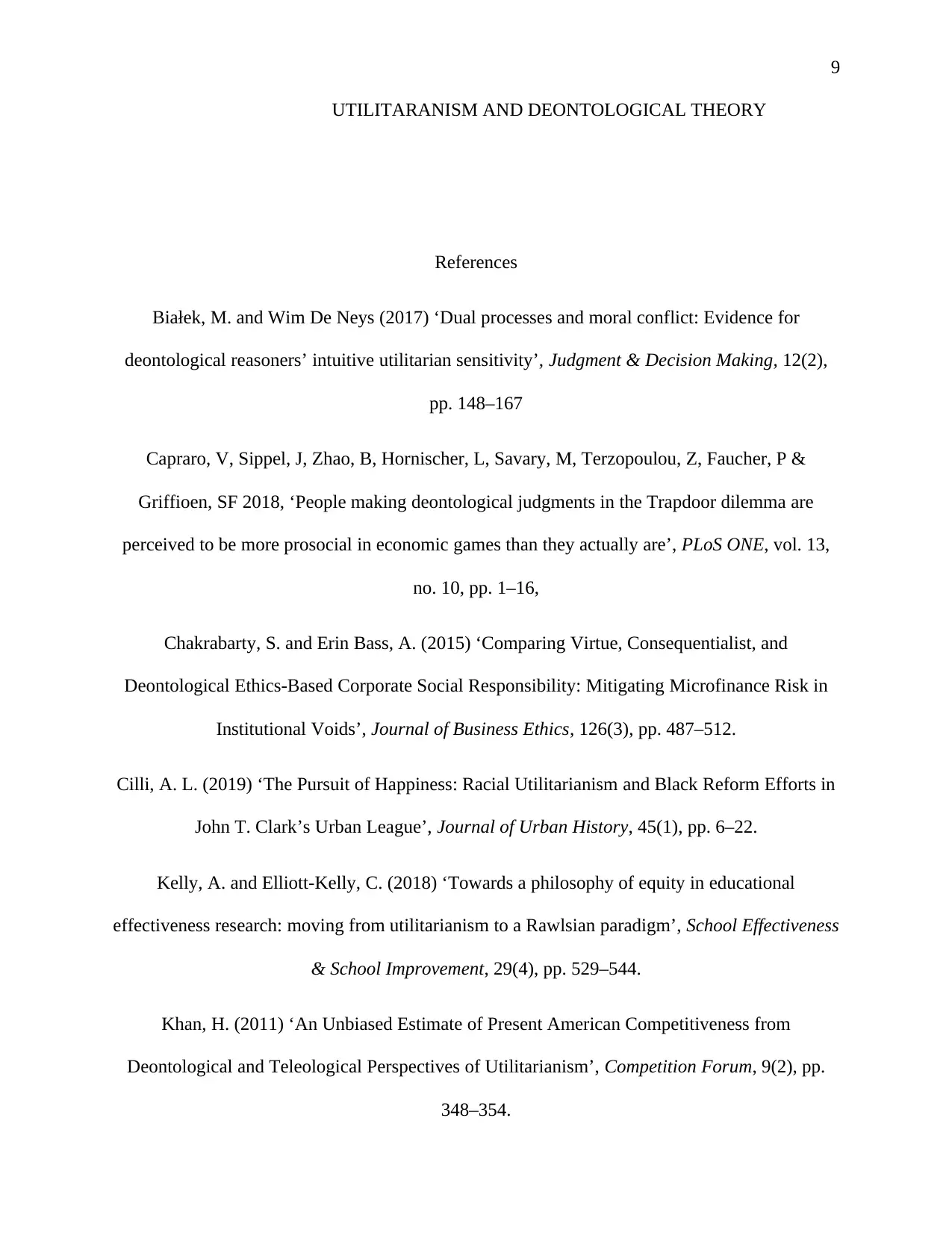
9
UTILITARANISM AND DEONTOLOGICAL THEORY
References
Białek, M. and Wim De Neys (2017) ‘Dual processes and moral conflict: Evidence for
deontological reasoners’ intuitive utilitarian sensitivity’, Judgment & Decision Making, 12(2),
pp. 148–167
Capraro, V, Sippel, J, Zhao, B, Hornischer, L, Savary, M, Terzopoulou, Z, Faucher, P &
Griffioen, SF 2018, ‘People making deontological judgments in the Trapdoor dilemma are
perceived to be more prosocial in economic games than they actually are’, PLoS ONE, vol. 13,
no. 10, pp. 1–16,
Chakrabarty, S. and Erin Bass, A. (2015) ‘Comparing Virtue, Consequentialist, and
Deontological Ethics-Based Corporate Social Responsibility: Mitigating Microfinance Risk in
Institutional Voids’, Journal of Business Ethics, 126(3), pp. 487–512.
Cilli, A. L. (2019) ‘The Pursuit of Happiness: Racial Utilitarianism and Black Reform Efforts in
John T. Clark’s Urban League’, Journal of Urban History, 45(1), pp. 6–22.
Kelly, A. and Elliott-Kelly, C. (2018) ‘Towards a philosophy of equity in educational
effectiveness research: moving from utilitarianism to a Rawlsian paradigm’, School Effectiveness
& School Improvement, 29(4), pp. 529–544.
Khan, H. (2011) ‘An Unbiased Estimate of Present American Competitiveness from
Deontological and Teleological Perspectives of Utilitarianism’, Competition Forum, 9(2), pp.
348–354.
UTILITARANISM AND DEONTOLOGICAL THEORY
References
Białek, M. and Wim De Neys (2017) ‘Dual processes and moral conflict: Evidence for
deontological reasoners’ intuitive utilitarian sensitivity’, Judgment & Decision Making, 12(2),
pp. 148–167
Capraro, V, Sippel, J, Zhao, B, Hornischer, L, Savary, M, Terzopoulou, Z, Faucher, P &
Griffioen, SF 2018, ‘People making deontological judgments in the Trapdoor dilemma are
perceived to be more prosocial in economic games than they actually are’, PLoS ONE, vol. 13,
no. 10, pp. 1–16,
Chakrabarty, S. and Erin Bass, A. (2015) ‘Comparing Virtue, Consequentialist, and
Deontological Ethics-Based Corporate Social Responsibility: Mitigating Microfinance Risk in
Institutional Voids’, Journal of Business Ethics, 126(3), pp. 487–512.
Cilli, A. L. (2019) ‘The Pursuit of Happiness: Racial Utilitarianism and Black Reform Efforts in
John T. Clark’s Urban League’, Journal of Urban History, 45(1), pp. 6–22.
Kelly, A. and Elliott-Kelly, C. (2018) ‘Towards a philosophy of equity in educational
effectiveness research: moving from utilitarianism to a Rawlsian paradigm’, School Effectiveness
& School Improvement, 29(4), pp. 529–544.
Khan, H. (2011) ‘An Unbiased Estimate of Present American Competitiveness from
Deontological and Teleological Perspectives of Utilitarianism’, Competition Forum, 9(2), pp.
348–354.
⊘ This is a preview!⊘
Do you want full access?
Subscribe today to unlock all pages.

Trusted by 1+ million students worldwide
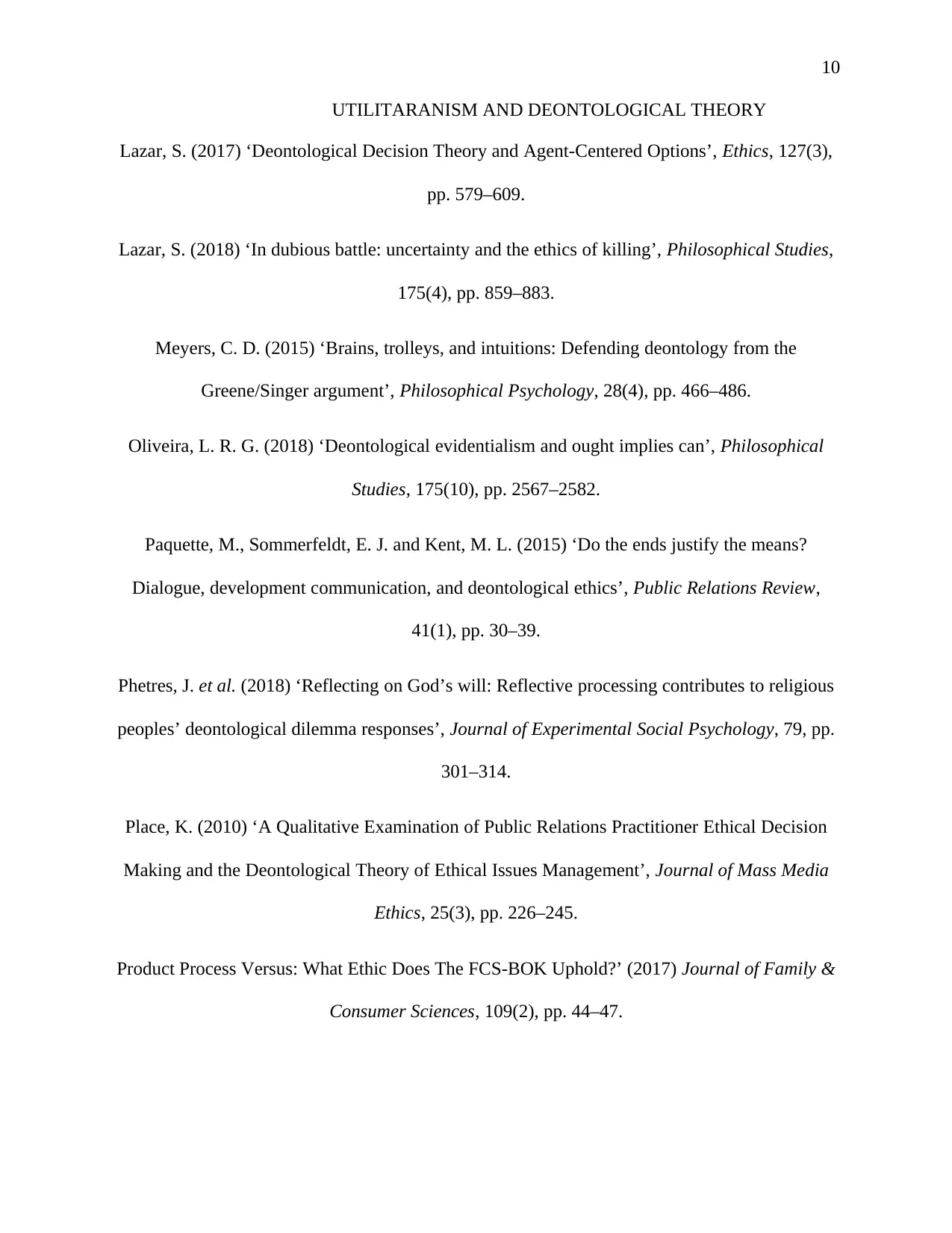
10
UTILITARANISM AND DEONTOLOGICAL THEORY
Lazar, S. (2017) ‘Deontological Decision Theory and Agent-Centered Options’, Ethics, 127(3),
pp. 579–609.
Lazar, S. (2018) ‘In dubious battle: uncertainty and the ethics of killing’, Philosophical Studies,
175(4), pp. 859–883.
Meyers, C. D. (2015) ‘Brains, trolleys, and intuitions: Defending deontology from the
Greene/Singer argument’, Philosophical Psychology, 28(4), pp. 466–486.
Oliveira, L. R. G. (2018) ‘Deontological evidentialism and ought implies can’, Philosophical
Studies, 175(10), pp. 2567–2582.
Paquette, M., Sommerfeldt, E. J. and Kent, M. L. (2015) ‘Do the ends justify the means?
Dialogue, development communication, and deontological ethics’, Public Relations Review,
41(1), pp. 30–39.
Phetres, J. et al. (2018) ‘Reflecting on God’s will: Reflective processing contributes to religious
peoples’ deontological dilemma responses’, Journal of Experimental Social Psychology, 79, pp.
301–314.
Place, K. (2010) ‘A Qualitative Examination of Public Relations Practitioner Ethical Decision
Making and the Deontological Theory of Ethical Issues Management’, Journal of Mass Media
Ethics, 25(3), pp. 226–245.
Product Process Versus: What Ethic Does The FCS-BOK Uphold?’ (2017) Journal of Family &
Consumer Sciences, 109(2), pp. 44–47.
UTILITARANISM AND DEONTOLOGICAL THEORY
Lazar, S. (2017) ‘Deontological Decision Theory and Agent-Centered Options’, Ethics, 127(3),
pp. 579–609.
Lazar, S. (2018) ‘In dubious battle: uncertainty and the ethics of killing’, Philosophical Studies,
175(4), pp. 859–883.
Meyers, C. D. (2015) ‘Brains, trolleys, and intuitions: Defending deontology from the
Greene/Singer argument’, Philosophical Psychology, 28(4), pp. 466–486.
Oliveira, L. R. G. (2018) ‘Deontological evidentialism and ought implies can’, Philosophical
Studies, 175(10), pp. 2567–2582.
Paquette, M., Sommerfeldt, E. J. and Kent, M. L. (2015) ‘Do the ends justify the means?
Dialogue, development communication, and deontological ethics’, Public Relations Review,
41(1), pp. 30–39.
Phetres, J. et al. (2018) ‘Reflecting on God’s will: Reflective processing contributes to religious
peoples’ deontological dilemma responses’, Journal of Experimental Social Psychology, 79, pp.
301–314.
Place, K. (2010) ‘A Qualitative Examination of Public Relations Practitioner Ethical Decision
Making and the Deontological Theory of Ethical Issues Management’, Journal of Mass Media
Ethics, 25(3), pp. 226–245.
Product Process Versus: What Ethic Does The FCS-BOK Uphold?’ (2017) Journal of Family &
Consumer Sciences, 109(2), pp. 44–47.
1 out of 10
Related Documents
Your All-in-One AI-Powered Toolkit for Academic Success.
+13062052269
info@desklib.com
Available 24*7 on WhatsApp / Email
![[object Object]](/_next/static/media/star-bottom.7253800d.svg)
Unlock your academic potential
Copyright © 2020–2026 A2Z Services. All Rights Reserved. Developed and managed by ZUCOL.





